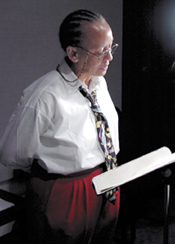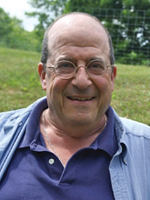Authors From RECORDED BOOKS
Kareem Abdul-Jabbar
![]()
Known for his larger-than-life accomplishments, Kareem Abdul-Jabbar--sports legend, cultural ambassador, and author--wants to address another important audience: young readers. His memoir, BECOMING KAREEM: GROWING UP ON AND OFF THE COURT, chronicles important lessons that he absorbed from a variety of teachers who guided his path, ultimately allowing him, as he writes, to “walk that path on my own, confident in my own choices.”
Diane Ackerman

Diane Ackerman believes that in times of pain or uncertainty, even in cheerful times, “we need to find enriching ways to transcend.” For Ackerman--poet, essayist, and author of such inspiring and passionate works as AN ALCHEMY OF MIND: The Marvel and Mystery of the Brain and THE ZOOKEEPER’S WIFE--transcendence has always meant losing herself in the wonders of nature.
Kwame Alexander
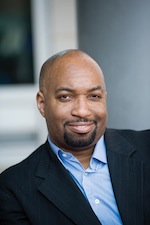
Josh Bell, the narrator of Kwame Alexander’s novel THE CROSSOVER, defines it as “a basketball move in which a player dribbles the ball quickly from one hand to the other.” This move, sudden and surprising, also describes the book’s dramatic change in success.
Sherman Alexie
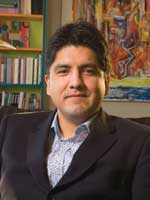
Sherman Alexie is used to reading his work aloud, but he didn’t expect to be the narrator of his 2007 National Book Award-winning novel for young adults, THE ABSOLUTELY TRUE DIARY OF A PART-TIME INDIAN.
Isabel Allende
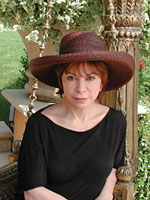
Writing letters provides the source material for many of Isabel Allende’s books. Her first internationally acclaimed bestseller, THE HOUSE OF THE SPIRITS, began as a letter to her 99-year-old grandfather. Her memoir, PAULA, recounting her family’s history, was written as Allende sat at her dying daughter’s bedside. Now, 13 years later, THE SUM OF OUR DAYS is a letter to Paula, updating her on what’s been happening in the family since she’s been gone.
Stephen E. Ambrose
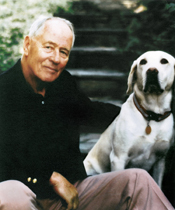
Stephen E. Ambrose is a patriot, arguably the most brilliant, compelling and least abashed patriot publishing history in this country today. He’s also a partisan of the spoken word.
“I’m a great fan of audiobooks,” said Ambrose, who had most recently listened to a Shelby Foote Civil War history. “I do a lot of driving across the country, and I always listen to a book. Reading a book on a computer is going to ruin your eyes. I think audiobooks are a leap forward.”
Kevin J. Anderson
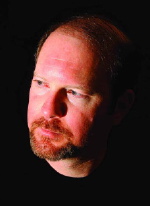
With over 90 books to his name, Colorado-based sci-fi scribe Kevin Anderson is a self-described write-a-holic. “I’m a storyteller. They keep coming and coming, and I keep writing. I once did 14 books in a single calendar year. I love telling stories.”
Maya Angelou
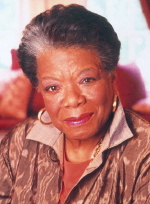
In every sense of the words, Maya Angelou is one of the great voices of contemporary literature. A remarkable Renaissance woman, she’s a poet, educator, historian, bestselling author of more than a dozen books, actress, playwright, civil rights activist, producer, director, and audiobook narrator. Angelou’s most recent book, HALLELUJAH, is an intimate and extraordinary journey through the author’s extraordinary life, using food as the featured player in her stories.
David Bach
It would be hard to imagine a more engaging audio teacher than author and CNN financial commentator David Bach. His books and audios, including THE AUTOMATIC MILLIONAIRE, are among the best financial guides available in any medium. In contrast to losing weight, which he says requires daily discipline, money management can be automatic. “Becoming wealthy is incredibly simple. It’s just not easy. But if I can get you in one hour to do a handful of things that set up automatically, you’re done unless you shut it off. It doesn’t take ongoing motivation.”
David Baldacci

In speaking with author David Baldacci about audiobooks, you soon realize he’s a “stone cold” optimist. “Some authors think that audiobooks detract from book readership,” he says. “I believe that audios add whole blocks of fans. I think the industry has to adapt, and however we can get new readers introduced to the joy of reading, we should do it.” Baldacci says that audios in all forms (cassettes, CDs, MP3-CDs, and downloads) account for about one-eighth of his total sales. “So if one of my books sells 700,000 copies in hardcover, nearly a hundred thousand more will be audiobooks.”
Nevada Barr
Nevada Barr’s enthusiasm for audiobooks is palpable. When it comes to the spoken word, Barr says, “I’m a serious audiophile.” Barr was named for her native state of Nevada. But she grew up in northeastern California and currently lives in New Orleans. She is the author of 17 novels, including 15 featuring Park Ranger Anna Pigeon, each set at a different national park. Barr knows the ranger service intimately, having served in numerous parks as a patrol ranger and law enforcement ranger.
Dave Barry
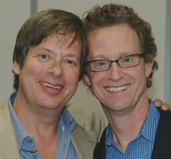
Dave Barry says he was ecstatic when he heard that Jim Dale had agreed to narrate the audio of PETER AND THE STARCATCHERS, the prequel to Peter Pan, which Barry co-authored.
Elizabeth Berg
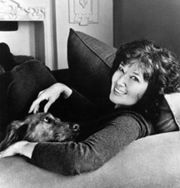
Elizabeth Berg, known for her life-affirming books about people in crisis, likes to listen to audiobooks with one exception: her own works. “The truth is I don’t listen to my own tapes because it’s hard to hear someone read your work in a way that you wouldn’t. So with my own work I tend to just listen a little to hear what the voice is like.”
Alice Blanchard
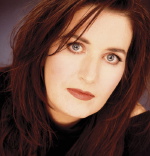
Among her many awards, Alice Blanchard won the Katherine Anne Porter Prize for Fiction for her book of stories, THE STUNTMAN’S DAUGHTER. But in making the transition from stories to novels, this Los Angeles resident reveals that her stories always tended to be long, so people often commented that she should write a novel.
Kimberly Brubaker Bradley
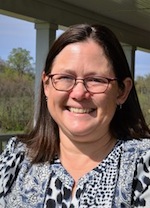
Those who listen to Kimberly Brubaker Bradley’s THE WAR I FINALLY WON may be surprised to find they love it even more than her award-winning first book, THE WAR THAT SAVED MY LIFE. Both books tell the story of a young Londoner named Ada who is sent to the English countryside during WWII.
Rick Bragg
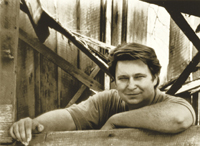
Rick Bragg’s northern Alabama accent is muted by seven years of working for The New York Times. But it comes out, especially when he gets emotional, and even more so when he becomes passionate, which he does when he talks about his writing. “I write for three reasons,” he says. “One, because I can. Two, you can change a lot. I’m not talking about my life, but you can affect so many people’s lives with a good story, whether it’s fifty pages or one. That’s how you know that what you do is important. The third reason is that it’s just got to come out somehow. That anger and that chest-thumping pride in your people has to come out. A book is just a rectangular yell. It’s a scream sometimes.”
Simon Brett
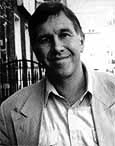
“Do you re-read your own books, Mr. Brett?” It’s a question which, as an author, I’m asked surprisingly often, and it’s one to which, these days, I tend to give the answer, “No and yes.”
No, I’m not one of those writers whose idea of a pleasant evening is luxuriating in his own prose, marveling at the euphony of its juxtapositions, the aptness of each sparkling image. I don’t have that kind of attitude about my work. I enjoy the writing process, but I also enjoy drawing a firm line under the end of a book and getting the wretched thing off my desk. For months of composition I live and dream with the book’s characters. But the minute I finish, I depart abruptly from their world and return to my own.
Douglas Brinkley
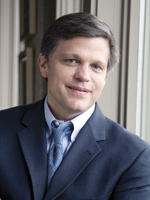
Author Douglas Brinkley believes a work of history should be long enough to tell the complete story. Ironically, it was his experience with the audio abridgment of one of his books that helped shape his writing style from that point on.
James Lee Burke
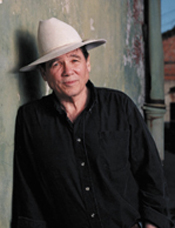
James Lee Burke, as listeners might expect, grew up in Cajun country. He and his cousin, the brilliant short story writer André Dubus, were born four months apart. Burke’s own literary accomplishments are no small feat. Referred to by Jonathan Kellerman as “the Faulkner of crime fiction,” Burke started his career with the publication of Half of Paradise in 1965. Not until his 1987 novel, Neon Rain, did he introduce Cajun cop Dave Robicheaux, who has consistently put Burke on the bestseller lists. Burke’s writing has a slow, methodical pace, like the flow of wind across the bayou, the vice and violence never gratuitous or sensational.
TAMI CHARLES
Critically acclaimed author Tami Charles’s life is defined by leaps of faith, including leaving a successful career as an educator to write full-time. “I give lots of credit to my husband. I was teaching and writing--early mornings, late at night, on weekends. But that takes its toll. ‘What if you go all in on the writing?’ he encouraged me.” Charles finally decided to “go for it” after securing her fifth book advance. “Even then, part of me was afraid to walk away from something I’d loved for years.”
Tracy Chevalier
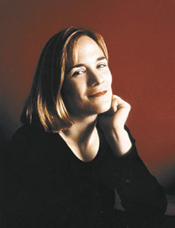
Some authors love rereading their work. Some, such as Tracy Chevalier, do not. “I don’t write my books for myself to read; I write them for other people to read. So I tend not to revisit a book when it’s done,” says Chevalier on the telephone from London, where she lives with her family. “It’s like seeing yourself in a video from behind when you’re not used to it. You say, ‘Oh my God, do my legs really splay apart like that? My walk is so goofy!’”
Harlan Coben
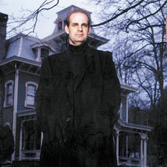
Harlan Coben is as funny in person as his sleuth is on the printed page. The winner of Anthony, Edgar, and Shamus awards, Coben was honored this past March at the Florida Mystery Writers of America "Sleuthfest."
Catherine Coulter
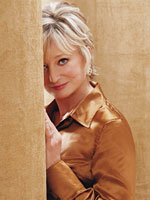
For 30 years Catherine Coulter has been entertaining fans with widely popular novels, including historical romances, romantic suspense, and suspense thrillers. In 1988 she hit the New York Times Bestseller List for the first time with her historical novel MOONSPUN MAGIC. She has now made the list 59 times.
Robert Crais
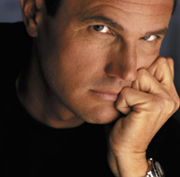
Robert Crais is crazy in the best possible sense of the word. His books ring with madcap characters as well as profound human observation, and in real life he is as charmingly sincere as he is nutty. AudioFile caught up with Bob Crais just as his latest thriller, HOSTAGE, was hitting the stands. The abridgment of HOSTAGE marks Crais’s first endeavor as an audiobook narrator.
Sharon Creech
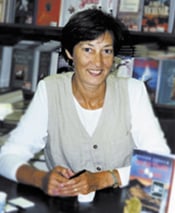
I wanted to be many things when I grew up,” says Sharon Creech Rigg. “A painter, an ice skater, a singer, a reporter. It soon became apparent that I had little drawing talent, very limited tolerance for falling on ice, and absolutely no ability to stay on key while singing. I also learned that I would make a terrible reporter because when I didn’t like the facts, I changed them.”
Nelson DeMille
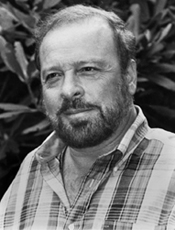
Nelson DeMille is an audiobook fan. He participated in the APA’s Audie Awards ceremony in Los Angeles last year and enjoys listening to unabridged fiction when he drives. People don’t have time to do everything they want or read all the books that interest them. “Audiobooks make you feel more productive,” says DeMille. Whether it’s self-help or fiction, he says, “Audio sinks in while you’re doing other tasks.”
Sarah Dessen
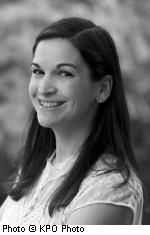
“I’m a huge audiobook person, especially after having my baby,” says Sarah Dessen, writer and mother of 2-year-old Sasha. “I listen to books in the car constantly. And on the treadmill. And when I’m pushing a stroller. Portable books are a whole new way to experience literature.”
Pete Dexter
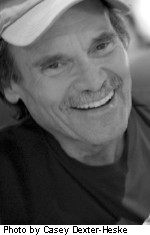
Pete Dexter just can’t help himself. He collects stories, and then he tells them. And if he’s not busy telling one of his own, he’s probably listening to someone else’s, plugged into a book on his iPod during daily workouts or the long road trips he often takes. “Well, I’m not in places where I collect stories so much these days--but once in a while I hear a good one, and it kills me to have no place to tell it.”
Wendelin Van Draanen
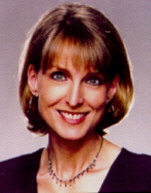
Sammy Keyes, the 13-year-old heroine of Wendelin Van Draanen’s series, is intrepid and determined and has a seemingly endless source of energy—much like her creator. When she isn’t writing, Van Draanen is probably teaching high school computer science, jogging with her Siberian husky, spending time with her family, or singing in a rock band! (Curious readers can hear her perform on the CD that is provided with her newest novel, the eighth in the series, Sammy Keyes and the Art of Deception, which includes an interview with the author, a reading from her previous book, Sammy Keyes and the Search for Snake Eyes, and a rocking rendition of "The Sammy Keyes Song.") Van Draanen received the 1999 Edgar Award for her first book in the series, Sammy Keyes and the Hotel Thief. Seven unabridged Sammy Keyes books are available from Live Oak Media.
John Dunning
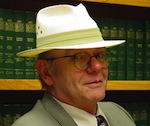
John Dunning’s new mystery sets aside the theme of his two earlier titles, BOOKED TO DIE and THE BOOKMAN’S WAKE, which feature bookman and ex-cop Cliff Janeway. In addition to his interest in antiquarian books, Dunning is also an expert on American radio history and the author of ON THE AIR: THE ENCYCLOPEDIA OF OLD TIME RADIO (Oxford University Press). TWO O’CLOCK, EASTERN WARTIME shares similarities with the Janeway stories because the listener learns so much about the radio (or book) business. Woven through the story are rich details of the actual making of radio in the 1940s.
David Anthony Durham
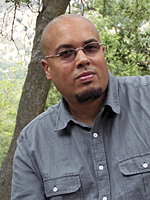
Listening to audiobooks is a multilevel experience for author David Anthony Durham. It’s not just entertainment for him. It’s part of his creative process. It’s work. It’s even a bit of an education. “I listen to audiobooks everywhere, all the time,” Durham says. He finds listening to audiobooks particularly invigorating while taking long walks in the woods near his western Massachusetts home. “I know men aren’t supposed to multitask very well,” he laughs, “but walking in the woods is about thinking about my stories. I do that partly by listening to other people’s stories at the same time. It’s definitely stoking my creativity.”
Janet Evanovich

The Voices of Janet Evanovich: Conversations with Lorelei King and C.J. Critt Janet
Evanovich’s hugely popular Stephanie Plum series and romances have an avid following on audio. AudioFile recently caught up with narrators Lorelei King and C.J. Critt to ask them what it’s like to bring these audiobooks to life. - 2009 Update
John Feinstein
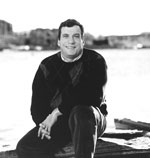
Readers and journalists value John Feinstein’s shrewd, accurate work as reporter, author, and critic as well as his passion for sports, and, fortunately for us, all of his titles have been audiobooks.
Paul Fleischman

Books often lend themselves to audio, but Paul Fleischman’s books are written with sound in mind. His several books of “poetry for two voices” include JOYFUL NOISE, AM PHOENIX, and BIG TALK. His Civil War novel, BULL RUN, is an oral tapestry told in 16 voices. MIND’S EYE is composed entirely of dialogue between a teenaged paraplegic and her 88-year-old roommate. SEEK is the story of a young man searching for his father, an itinerant disc jockey, using shortwave radio.
Tana French

Tana French appeared on the mystery scene quietly, but in a short time her novels have taken the literary crime world by storm. Like a pint of Guinness, with nothing “lite” about it, her writing gives off a crisp flavor and a full body that leaves the reader satisfied to the final sip. Her debut novel, IN THE WOODS (2007), won the Edgar, Macavity, and Anthony awards for Best First Novel. Each of her three novels has received universal praise.
Alan Furst
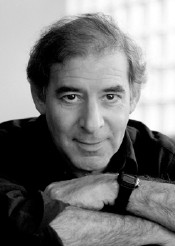
“I write out loud,” explains Alan Furst, the master of historical espionage. “I find myself dry-mouthed after a couple of hours of writing. I am writing by the sound of the prose. No other way.”
Diana Gabaldon

Diana Gabaldon, author of the bestselling Outlander and Lord John Grey historical fiction novels, first met Davina Porter, narrator of the Outlander books, at a library fund-raiser.
Neil Gaiman
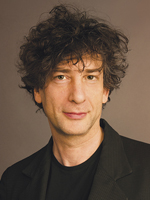
Technically, the first person to hear Neil Gaiman’s new novel, THE OCEAN AT THE END OF THE LANE, was his wife, musician Amanda Palmer. Gaiman handwrote the first draft of the novel while Palmer was far away in Australia.
Lisa Gardner
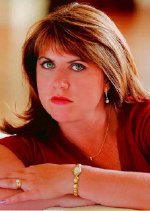
When one imagines the type of person who writes dark thrillers about FBI agents and serial killers, abduction, abuse, and violence, Lisa Gardner is not the kind of person who comes to mind. She’s the kind of person you’d expect to meet at toddler time.
Elizabeth George
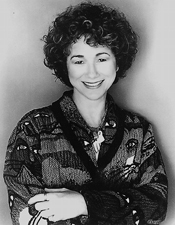
Elizabeth George never listens to her own works on audio. “I imagine very distinct voices for each of my characters,” she says, “especially that of Detective Inspector Thomas Lynley. Except for a brief excerpt by Derek Jacobi, I don’t listen to my audios because I’m concerned that I would lose the voices I carry in my head.”
Tess Gerritsen
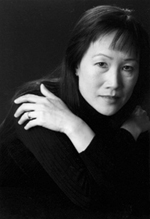
Tess Gerritsen had published nine romantic suspense novels when she began formulating a medical thriller. Then she was told publishers only want medical thrillers written by doctors. Gerritsen responded, “ I am a doctor!” What followed was a string of highly successful medical thrillers: Harvest (1996), Life Support (1997), Bloodstream (1998), and Gravity (1999). The Surgeon, Gerritsen’s latest novel, introduces Boston detectives Thomas Moore and Jane Rizzoli, as well as trauma physician Catherine Cordell.
John Gray
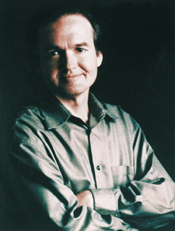
It’s surprising to realize that John Gray’s Mars and Venus books have only been with us for 10 years. It seems like he’s been on the personal development scene forever. He was in Chicago doing media interviews for his new book—Mars and Venus in the Workplace—when AudioFile caught up with him and asked him about his background. “I started out being a teacher, teaching Transcendental Meditation during the heyday of meditation, studying with a maharishi for nine years.” Then he decided to go to graduate school in psychology. It was as a therapist that he developed the relationship concepts he taught in seminars and first wrote about in Men Are from Mars, Women Are from Venus.
Melissa Fay Greene
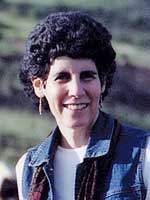
Melissa Fay Greene has always wanted to narrate the audio editions of her books but has learned that publishers have a different perspective. “I auditioned for LAST MAN OUT,” she says. Instead of being hired to read the chronicle of 19 coal miners who survived nine days trapped in a mine collapse only to become a centerpiece in the battle to desegregate the South, Greene received a “funny response. We laughed about that response for a long time. They said it was something better than the mediocre performances many authors turn in, but still not at a professional level.”
Philippa Gregory
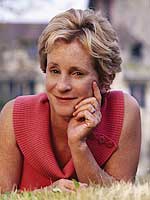
Philippa Gregory’s novels are fast moving and well researched, but perhaps their greatest strength is how they rescue women from “the shadows of history.” Take Mary Boleyn, for example, the heroine of THE OTHER BOLEYN GIRL and one of Gregory’s favorites. “She’s an extraordinary character, and she’d been largely lost to history before I read her story and presented it to a world that had forgotten her.”
Beth Gutcheon
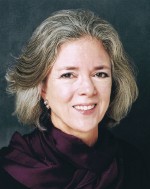
Beth Gutcheon was 10 years old when she heard that the Danish king had worn a yellow armband during WWII to show his support for the Jewish people. It wasn't true. No matter, says Gutcheon. By the time she went to Denmark as an 18-year-old au pair, she knew that the Danes did save their Jewish population and that one day she would write about it. Gutcheon's newest novel, LEEWAY COTTAGE, is that account.
Richard Hack

Richard Hack is no stranger to audiobooks. “I was in on the ground floor and have long been a pro-ponent of them,” says the one-time Vice President of Creative Affairs at Dove Audio. “I listen every day at the gym. I select them based on their ability to transform me to another land, to take me away from the drudgery of being on the treadmill.”
Laurie Halse Anderson
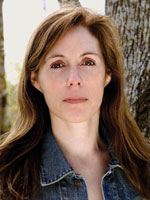
Laurie Halse Anderson’s newest character, Lia, of WINTERGIRLS, hears voices. And so does the author! “I can make a lot of notes about a book, but until I can hear the character talking in my head, I can’t write it. You could say that my books are audiobooks first, which I then translate into visual text. I think that’s why I am so particular when it comes to listening to audiobooks. If the narrator’s voice doesn’t ring comfortably inside my skull, I can’t listen to the book.”
Pete Hamill
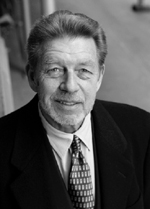
Pete Hamill closed the computer on his new novel, FOREVER, just before midnight on September 10, 2001. Less than 10 hours later, his fresh manuscript, “covering more than 350 years of Western civilization, as recounted through the eyes of its central character, writer Cormac O’Connor,” was already outdated, overtaken by events. But as the veteran New York City newspaperman and his wife watched clouds of smoke billow from the World Trade Center, all his reporter’s instincts were riveted on getting that story out as thoroughly and vividly as he could.
Laura Hillenbrand
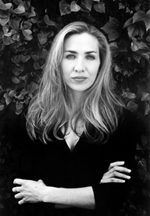
Laura Hillenbrand, author of SEABISCUIT: AN AMERICAN LEGEND (Random House), the enthralling new bestseller evoking the spirit of a previously untapped episode of this nation’s social history, is endlessly dependent on audiobooks in her life. (More on that later.) So she had more than a passing interest in her publisher’s plans for the spoken word version of her saga about the undersized, crooked-legged, mud-colored horse that—together with an owner, trainer, and jockey—produced the unlikely triumphs that captured people’s imagination in Depression-era America.
Tony Hillerman
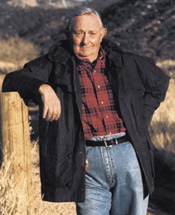
The voice over the phone has a lilt and twinkle to it. “Can you take my Okie accent?” novelist Tony Hillerman asks, chuckling across the miles from his home in Albuquerque, New Mexico, where he and his wife Marie were reveling in what he describes as “the most dazzling, colorful autumn” along the Rio Grande. Hillerman is, of course, the creator of the popular series of contemporary police procedurals rooted in Navajo society, legend, and customs, which features Officers Joe Leaphorn and Jim Chee. Now he is both author of a new memoir, SELDOM DISAPPOINTED and narrator of the 12-hour audiobook version. “The reading experience is just a chore,” he reflects, pulling no punches, which, as the memoir reveals, is clearly his approach to life. “The audio guys make you stop, make you pronounce words the way they’re supposed to be pronounced. They want you to sound like an East Coast Yankee.” Actually, he adds, “It’s easy enough to do. You just sit there and read aloud. But the writing process is a brand new experience each time. Sometimes it’s like pulling teeth and practically impossible. But then you have your real good moments, when you think you’ve done a good job.”
Alice Hoffman
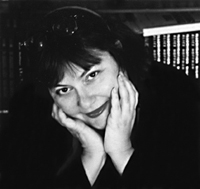
Though many listeners have discovered the work of Alice Hoffman through her most recent books —TURTLE MOON; LOCAL GIRLS, made into a movie; and HERE ON EARTH, an Oprah selection — she’s no overnight sensation. She’s been writing and publishing for 25 years. A trip to the fiction section of Borders reveals nearly a whole shelf of her work.
Phillip Hoose

On the final day of a bicycle trip in Denmark back in 2000, author Phillip Hoose visited the Museum of Danish Resistance in Copenhagen, where an obscure exhibit caught his eye. “It was this little shrine to something called the Churchill Club. It had a photograph of these teenage boys--who looked like they’d yet to shave!--holding up numbers in a prison yard.”
Anthony Horowitz
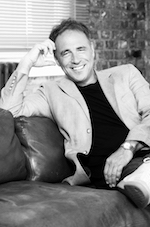
Some days, Anthony Horowitz feels more like a secretary than a writer, which is a tad surprising for the author of 49 novels and many screenplays. He should be the one in charge, yet, “Often I have to write with a pen because I can’t type fast enough to keep up with the speed my characters are talking. It’s as if I’m sitting on the side of the room with a notebook and a pen, furiously scribbling in shorthand the words I’m hearing.”
Greg Iles
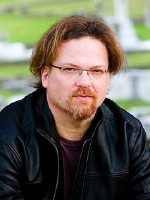
Mississippi novelist Greg Iles likes to tell the story of a book signing in Seattle during which a reader told him that after finishing THE QUIET GAME, he and his wife drove 2,500 miles just to see Natchez, Mississippi, the thriller’s setting.
J.A. Jance
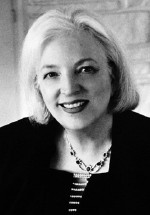
J.A. Jance's firm and resonant voice, combined with her thoughtful way of considering each question before answering, makes interviewing her a pleasure. Along with her many dedicated fans, she is glad to welcome back world-weary J.P. (Jonas Piedmont) Beaumont, a little older, a bit grayer, but still passionately devoted to finding justice--including solving a fifty-year-old murder case. This author, who divides her time between homes in Seattle and Tucson, obviously cares deeply about her fictional characters, as well as her many audio fans. "I think I was born with a storyteller's bone! And I'm not at all sure that it's something that can be taught in creative writing classes--in fact, those classes may actually detract from natural storytelling.
Iris Johansen
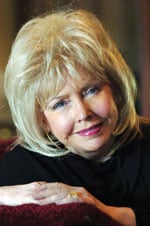
In the early 1980s, with her children leaving home for college, Georgia homemaker Iris Johansen began filling her empty nest with the array of fictional characters who populate the romance novels she wrote for the Bantam Loveswept series. Today, more than 60 books later, Johansen is well known as the author of contemporary romance, historical romance, and forensic thrillers. This spring marked the publication of her twelfth thriller featuring forensic sculptor Eve Duncan. Hot off the presses this summer will be SILENT THUNDER, a stand-alone thriller and her first collaboration with her son, Roy.
Craig Johnson
AudioFile caught up with Craig Johnson, Wyoming-based author of the bestselling Walt Longmire series, just before he was about to take off on his motorcycle to continue the book tour for his recently released novel, DRY BONES. After the Longmire books grew in popularity, Johnson began hearing from independent bookstores in small, out-of-the way places, asking when he could visit. “After about four years, in order not to disappoint, I started doing The Great North American Outlaw Motorcycle Tour,” he says. He allows two weeks for this tour. “But I’ve learned that after doing a month-long national tour, I need to give myself some time to get things done here at home, get squared away at the ranch, before I take off and go again.”
Stuart M. Kaminsky
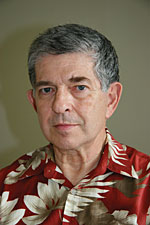
“What makes me an effective storyteller? That’s a good question,” says Stuart Kaminsky. “I don’t know. I’ve loved stories since I was 12 years old. I loved movies. I loved radio. I loved reading. I always read, and telling stories was what I wanted to do. My mind was always overflowing with stories.”
Jan Karon
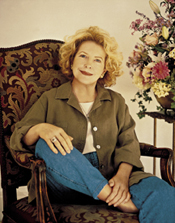
As author of the popular Mitford books, Jan Karon enjoys writing about the familiar and the ordinary. Her novel series features lead character Father Tim and a cast of heartwarming characters who live in the mountain town of Mitford, North Carolina. “I never take my readers far from home,” she says. “We don’t go to Alaskan outposts or Italian villas or the French Riviera in the Mitford books—we hang out in somebody’s kitchen or go to the grill down the block or make a tomato sandwich and eat it standing up at the sink.” Karon writes this way “so that my readers can fully participate in what’s going on in the story.
Jonathan & Faye Kellerman
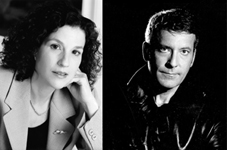
One might imagine, at first blush, that there’s a cottage industry a-plying its trade in the comfortable Beverly Hills home of Faye and Jonathan Kellerman (and their four children)—two of the better-known and more successful current mystery writers.
Tracy Kidder
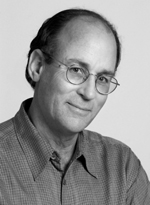
Tracy Kidder has been reading aloud for the better part of a day and a half when he stumbles over the words “lymph nodes.”
Laurie R. King
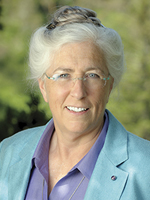
Since the publication of her first novel in 1993, third-generation Northern Californian Laurie R. King has seen 21 of her novels--along with various short stories and novelettes--in print. King, who holds a master’s degree in theology from Graduate Theological Union, has also edited several anthologies and works of nonfiction. She is a member of the Baker Street Irregulars, an exclusive society of Sherlock Holmes enthusiasts.
Stephen King
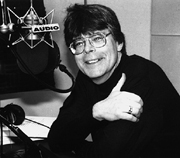
“The human voice always adds a dimension to good writing,” says Stephen King. In an interview with AudioFile, King talked about his experience narrating his new novel, BAG OF BONES, and why he’s so enthusiastic about audiobooks. “It’s possible to have a much more intense emotional experience listening to a reading of any work of literature than by reading it to yourself.”
Stephen King & Stewart O'Nan
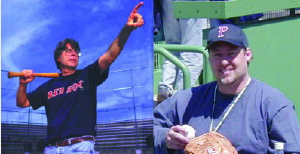
Stephen King’s friendship with Stewart O’Nan was born out of a literary dispute. Nine years ago, O’Nan wanted to title his third novel DEAR STEPHEN KING.
Robert Kiyosaki
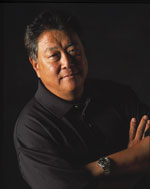
RICH DAD, POOR DAD was the first of a series of books and audios by Robert Kiyosaki that have revolutionized the way people think about money. Written in collaboration with CPA Sharon Lechter, they’ve helped people all over the world change from being employees to owning assets like businesses, real estate, intellectual property, and stocks. The New York Times bestseller for four years running was the outgrowth of a learning habit that really began when Kiyosaki returned from Vietnam in 1976. He bought a new car that had a brand-new gadget in it—a cassette player.
Nicole Krauss
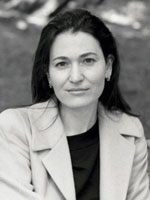
After her short story “From the Desk of Daniel Varsky” was published, Nicole Krauss couldn’t stop thinking about it. “I thought that maybe I should open it back up again, and as soon as I did that, I realized there was so much more to say.” The resulting novel, GREAT HOUSE, was named a finalist for the 2010 National Book Award in Fiction. Krauss is no stranger to awards; her first novel, MAN WALKS INTO A ROOM, was a finalist for the Los Angeles Times Book Award, and her second, THE HISTORY OF LOVE, won the William Saroyan International Prize for Writing in 2008.
Mark Kurlansky
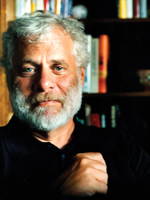
With a bestseller explaining how table salt helped shape civilization and an award winner that shows the role of the oyster in the development of New York City, journalist Mark Kurlansky has a talent for helping readers--and listeners--to see the world and the foods we eat in new ways. His far-reaching books have included THE LAST FISH TALE, about the culture of an English fishing village; 1968: THE YEAR THAT ROCKED THE WORLD, in which he examines the 12 months following the Summer of Love; and THE BASQUE HISTORY OF THE WORLD, about a unique and ancient culture that struggles to keep its place in the world. His one novel, BOOGALOO ON 2ND AVENUE, is a humorous snapshot of food, guilt, and ethnic diversity in the East Village.
Jonathan Lethem
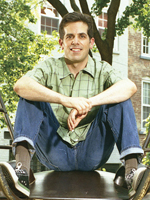
GUN WITH OCCASIONAL MUSIC (1994), Jonathan Lethem’s first novel, was lauded as a visionary work. His fifth novel, Motherless Brooklyn, a detective story featuring a narrator with Tourette’s syndrome, was his first to be adapted for audio, with an unabridged version read by Frank Muller and an abridgment performed by Steve Buscemi. FORTRESS OF SOLITUDE (2003) is an epic tale of race relations, rock music, and two Brooklyn boys with a magical ring. His newest work is a collection of short stories, MEN AND CARTOONS (see review), and in March, Random House Audio will publish a collection of Lethem’s personal essays, THE DISAPPOINTMENT ARTIST.
Grace Lin

Grace Lin is such an avid audiobook fan that, she says, “I don’t read physical books anymore.” Her latest favorite is Sophie Hannah’s THE ORPHAN CHOIR. Lin juggles parenting, writing, illustrating, and presenting. With audiobooks, she can listen and get something else accomplished. What’s more, she says, “On an airplane, I used to get kind of sick, but I can listen to a story, and I’m fine.”
Lois Lowry
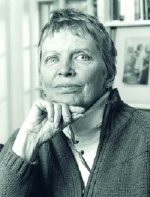
Writing has always been a part of Lois Lowry’s life. “As a child, my mother let me cover the dining room table with blankets and crawl inside to create my own private world. I would place my little construction paper houses and build the roads and make the rules for my imaginary people.” Sometimes she created a language for this imagined place, and there were often particular rules of naming. “There would be a hierarchy, a constitution, and systems of justice and education.” Today, to reach her goals, she does “exactly the same thing”—except for the crayoned houses. And you won’t find her under the dining room table. “I sit down at my desk and my computer every morning. It’s the place I most love to be.”
Debbie Macomber
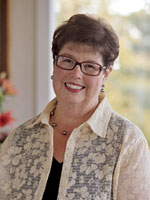
Debbie Macomber has written so many bestselling novels that the list of titles on her Web site scrolls for several pages. The number of audiobooks she’s heard may be almost as long.
Gregory Maguire
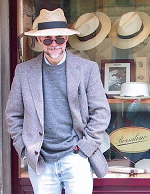
Listening to Gregory Maguire’s recording of LEAPING BEAUTY: AND OTHER ANIMAL TALES, you will meet a gorilla queen, a frog with a promising dance career, and one very bad walrus. You will not, however, hear the story of the very muddy rhinoceros. Maguire may yet write that story—having been inspired in the Harper Audio studio by enunciating into a huge black foam implement [i.e. the microphone] that looks like a used q-tip for a very muddy rhinoceros.
Phillip Margolin
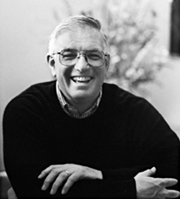
Phillip Margolin brings things to his legal thrillers that few other authors can claim. During his 25 years as a criminal defense attorney, Margolin represented 30 homicide cases, including 12 death penalty cases. His clients included serial killers and heads of drug cartels, as well as battered wives. “So when I’m writing about something to do with law,” he told AUDIOFILE just hours before heading off on a month-long book tour, “it’s probably something that I’ve actually done in real life. I know how people talk, how they walk, what the procedures are, how the judge talks in chambers.”
Armistead Maupin
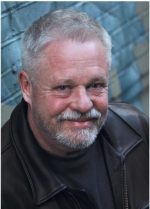
THE NIGHT LISTENER has just opened in theaters with an all-star cast including Robin Williams and Toni Collette—and includes frequent audiobook narrators Becky Ann Baker, Joe Morton, and Maryanne Plunkett. In 2000, AudioFile talked with author/narrator Armistead Maupin about his new audiobook.
Peter Mayle
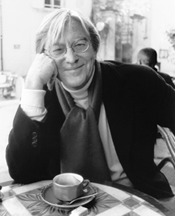
Peter Mayle, bestselling author of A YEAR IN PROVENCE, TOUJOURS PROVENCE, and ENCORE PROVENCE, offers some advice, when asked, to dreamy readers who want to follow in his footsteps by moving to France. “For people who want to live in the country,” he says, “I suggest going over in November and renting something for the winter. If you like it then, you'll love it the rest of the year. So many people go in the summer, when they have a couple of weeks of perfect weather. It's a different place in the winter—I happen to like it very much, but it's not the same at all. So I would say—go there at the least busy, most chilly time of year and see how you like it.”
Colum McCann

Award-winning and bestselling novelist Colum McCann’s speaking voice is a soft and lyrical Irish brogue, but his sound didn’t fit for one job he thought he would automatically win. “I’m Irish, and I’m a ham. I absolutely love to read, but something happened to me a few years ago. Maybe I shouldn’t tell this. I wrote [the novel] LET THE GREAT WORLD SPIN, and I knew they were going to use a number of different narrators, and the book actually turned out beautifully. But I wanted to read the Irish character.” He called the producer and requested the job but was told, “Normally, we get actors to do this, and they audition. I said, ‘I’ll do an audition,’ so I went downtown, I did my audition, and guess what-- I didn’t get the part for my own book.”
Frank McCourt
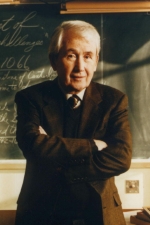
It is a special pleasure to talk with Frank McCourt, a retired schoolteacher and now a bestselling author three times over with a gift for the spoken word. Vitally honest, he is sincere, direct, pithy, charming, and sometimes self-deprecating as he talks about his newest book, TEACHER MAN, based on 35 years of teaching in New York City public schools.
David McCullough
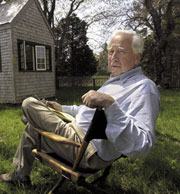
The historian and writer David McCullough thinks books ought to be written for the ear as well as the eye. “My wife reads to me, and I read to her,” says the author of the current bestseller JOHN ADAMS. “Reading aloud should not just be for children.” With a philosophy like this, it’s no wonder that works such as TRUMAN and THE GREAT BRIDGE (about the Brooklyn Bridge) translate so well to audio.
Ron McLarty
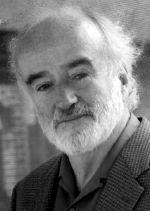
Ron McLarty has had a charmed career as a character actor across the years—vaulting from stage to screen to TV to commercials (once as a cold capsule) and voice-overs (as the Berenstains’ Papa Bear) to audiobook narrator, all while raising a family as well.
John McPhee
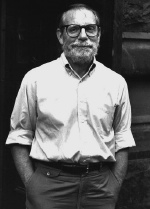
The next time I go camping, I want author John McPhee to go with me. Not for his knowledge of the natural world, which, admittedly, is immense. Rather, it’s because, around the campfire, I cannot imagine a more engaging storyteller. He weaves hard scientific facts and figures into a tale that is so personal and engaging that one doesn’t realize how much one is learning.
Elvis Mitchell
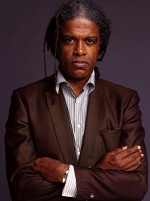
Award-winning New York Times movie reviewer, entertainment journalist, and radio and television host Elvis Mitchell says he felt good about the hardcover book and HBO special based on his effort to “take back” the words “black list.” But he was concerned about how THE BLACK LIST would work as an audiobook. “It frankly made me nervous about doing this because I know how audiobooks really work,” Mitchell says. “When an audiobook works, it’s creating an environment for you.”
John Mortimer
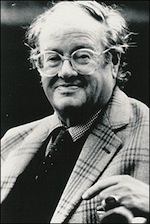
Novelist/playwright John Mortimer’s writings share a preoccupation with lawyers (he himself is a barrister), a satiric
edge softened by the gentleness of his wit and a whimsical melancholy underlying his humor. Moreover, he writes for the ear. He composed his first play, The Dock Brief, for radio; only later did it gain success with Michael Hordern on the West End and Broadway. Even his novels and memoirs seem designed to be read aloud. Perhaps that’s why he’s one of England’s most “audiobooked” living authors. Somewhere around 30 Rumpole of the Bailey titles alone are currently available. Mortimer’s favorite narrators of his own works are Leo McKern and Martin Jarvis. He, too, has stepped to the mike from time to time recording his memoirs. (Alas, Mortimer’s readings are available only in the U.K.) AudioFile was, therefore, pleased to ask Yuri Rasovsky, who produced the first American radio production of The Dock Brief, to phone him on our behalf.
Katherine Mosby
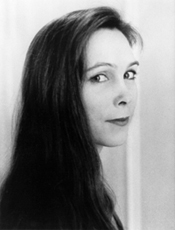
A dedicated poet/novelist, Katherine Mosby, author of the critically acclaimed first novel Private Altars and a book of poetry, The Book of Uncommon Prayer, agonizes over getting the sounds in her writing just right. “The only way that I know how to do it is to read it out loud, to go sentence by sentence and to savor it, to weigh the words and see how they scan and think about the impression they’re making musically.” She admits she might like to read one of her own books for audio since she knows the work best. “I know how to shape the lines as close to the way they were intended as anyone else would.”
Walter Dean Myers
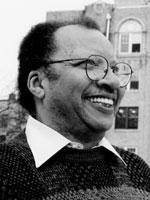
“You have to not love the words.” What a surprising thing for author Walter Dean Myers to say!
Audrey Niffenegger

Moviegoers stood in line earlier this year to catch the film adaptation of Audrey Niffenegger’s THE TIME TRAVELER’S WIFE, but its creator wasn’t among them. That’s surprising for the visual artist who originally planned the book as a graphic novel. She says she was advised that it was best to set aside her interest when she sold the film rights. “It’s great for book sales,” she adds, a fact borne out by its reappearance on bestseller lists five years after its release.
Joyce Carol Oates

"Audiobooks are wonderful inventions," says the award-winning author Joyce Carol Oates. "People are often so enthralled by them that they’re disappointed when their trips end. I’ve often sat in our driveway listening to the ending of something—reluctant to break the spell. Obviously, we all love to be told stories, especially by skilled professional storytellers."
Daniel José Older
New York Times bestselling author Daniel José Older always knew he wanted to tell stories--it just took a while to settle on a medium. “For a good period, I was more involved with music, but with a focus on storytelling. Even when I was mostly doing music, I was still always writing. I was all over the map. I did screenplays, poems, articles. But I wasn’t getting any traction; I didn’t know how to publish.”
James Patterson
James Patterson populates his books with terrorists, serial killers, and ruthless criminal masterminds. In contrast to the grisly content of his bestselling novels, Patterson turned out to be a pleasant, easygoing man when AudioFile caught up with him during his four-month, thirty-city tour. “I’m addicted to audiobooks, and every time I get in the car now, that’s all I do. I’m a huge, huge fan,” said Patterson, whose novels top the audiobook sales charts. “It’s a really exciting form. In particular for people who spend a lot of time driving or jogging, it’s the best. I converted about three years ago.” Up until that point, Patterson had led the hectic life of a city dweller. “I had no time. I didn’t want to think about audiobooks. Then I moved to the country. I spend a lot more time in the car. Now every time I get in the car, in goes the audiobook, even if it’s a ten-minute trip.”
Jodi Picoult
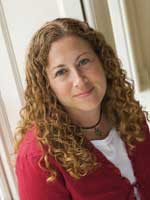
When bestselling novelist Jodi Picoult is writing, her head is full of shouts and murmurs and the rapid-fire conversation of people interrupting each other. “Sometimes,” she says, “it seems that all I’m doing is writing down what I hear.”
Mary Pipher
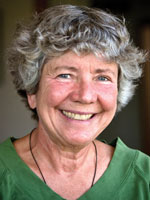
Mary Pipher was a college professor, psychotherapist, and community activist in 1994 when Reviving Ophelia, her bestseller on the needs of adolescent girls, made her a national celebrity. The psychologist and humanitarian went on to write similar books on the needs of refugees, the elderly, and families--all well-regarded and compassionate volumes that focus on other people and share a common methodology. “Most of what I’ve done,” Pipher says, “is try to be a really good listener to a demographic group. And then when I really feel like I have a sense for that population, I try to integrate that information in a way that allows other people to have a sense of them, care about them, and want to act on their behalf.”
Ian Rankin
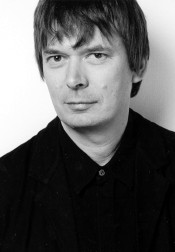
Sound emanates from Ian Rankin’s novels, whether in print or on audio. His books, featuring Detective Inspector John Rebus, are dark and edgy police dramas set in the author’s native Scotland. But instead of bagpipes you’re more likely to hear the Rolling Stones or The Cure.
Kathy Reichs
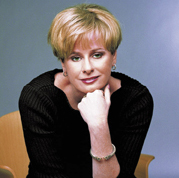
How does Kathy Reichs manage to be both an accomplished forensic anthropologist and a bestselling author? It takes “organization and discipline; whenever I’m not on a case, in court, or on the road, I pretty much write all day,” says Reichs. “So far I’m able to do it.” Indeed she does. In her new adventure, GRAVE SECRETS, Tempe Brennan is sent to find the truth about a brutal massacre that happened in a Guatemalan village in 1982. Similarly, Reichs went to Guatemala in the year 2000 as part of a human rights research team with Clyde Snow, a renowned forensic anthropologist. She says, “My stories are derived from real cases I’ve worked on. The situation in the book was modified somewhat, but villagers really came and watched the excavation and removal of the bodies from the well.” As for the background of the village massacre, Reichs said that it was “pretty much as described; men had fled the village, and the women and children were rounded up by the soldiers and killed.” Many people she worked with had to flee the country, and things aren’t completely cleaned up there yet. She says, “The world is not aware of what is happening there.”
Nora Roberts
According to PUBLISHERS WEEKLY, Nora Roberts has written more bestsellers than anyone in the world. How does she do it? “Reading is the best writer’s tool in the box,” Roberts says. “I did plenty of that as a child. I think sometimes you’re just a born storyteller. You have to learn the nuts and bolts in order to turn that storytelling ability into articulating an entertaining story on the page, but a lot of times it’s instinctive.” Since her first published book in 1981, Roberts has produced about seven books a year. She adds, “It doesn’t matter how fast I write, it’s the quality of the output I care about. My books are about people. They’re character-driven. Relationships are the key to all of my books.”
John Sandford
John Sandford defies being pigeonholed or categorized. He’s a man’s man, and his two dozen thrillers are certainly men’s adventures, yet his characters display both sensitivity and sexiness that appeal to female readers. Sandford is a Midwesterner, a longtime resident of Minneapolis/St. Paul. His books are set primarily in Minnesota, with characters who eat, breathe, and sweat the prairie. But his themes and the storytelling with which he reveals them are universal. In 1986 he was awarded the Pulitzer Prize for a newspaper series he wrote about American farm families in crisis. After that, he turned his talents to fiction and has seldom looked back.
Lisa Scottoline
When bestselling author Lisa Scottoline writes, she surrounds herself with sound. “I have on satellite radio and the Olympics, and dogs are barking in the background. It’s all good for me! At one point, I even had a baby monitor in the chicken coop so I could hear them, too!” Scottoline believes these sounds contribute energy and rhythm to her work. “I like the cacophony. I like voices. They help me think better.” Listening, she believes, helps her tap into what she calls the aural component of writing, helping it “ring true. When the writing rings false,” she explains, “you feel it in your ear.”
Jeff Shaara
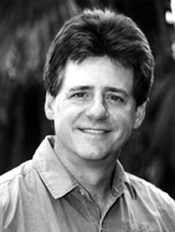
The historical novels by Jeff Shaara adapt well to audio in part because they depict action, dialogue and interior monologues.
Carol Shields
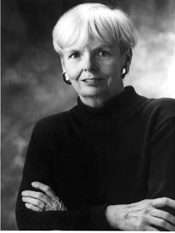
Carol Shields, winner of the Pulitzer Prize and the National Book Critics Circle Award, has narrated all three of her books—THE REPUBLIC OF LOVE, THE STONE DIARIES, and now her newest, LARRY’S PARTY. She always wanted to be an actress. “I always tried out for parts in the school play, but I was too self-conscious, and I didn’t have a loud voice.” When her publisher, Viking, offered the chance to read her works, she thought, “Here’s something I can do!”
Daniel Silva
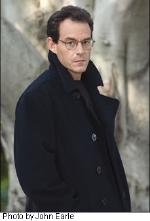
Daniel Silva was a happy camper in Washington in the mid-1990s with a “really interesting” job as a CNN producer, after years covering a range of Middle Eastern conflicts as a wire service correspondent based in Cairo. Married to NBC News correspondent Jamie Gangel (they met on separate assignments in the Persian Gulf and married in 1988), and a new father of twins, he decided to take a shot at writing fiction—“in secret,” as he describes it—for a couple of hours every morning before work. The Unlikely Spy, a WWII-vintage espionage thriller flirting with actual history, turned out to be an unlikely bestseller.
Jane Smiley
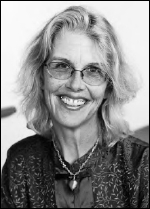
Have you heard that TEN DAYS IN THE HILLS by Pulitzer Prize-winning author Jane Smiley is about sex? Of course you have. Every reviewer says so. A Boston radio interviewer even asked her how she could describe so many different sexual encounters. How, he wanted to know, had she done her research?
Martin Cruz Smith
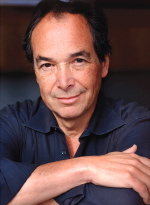
Martin Cruz Smith had no intention of writing about Chernobyl when he began WOLVES EAT DOGS, his latest Arkady Renko epic, a couple of years ago—more than 15 years after the 1986 nuclear disaster in the Soviet Union. But then a light went on in his mind, and he began focusing on the incident and was swept away.
Alexander McCall Smith
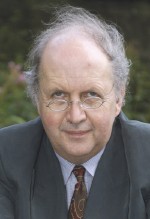
Alexander McCall Smith says that spending time with a new woman was “a little bit difficult at first.” After all, he has been with the inimitable Precious Ramotswe of No. 1 Ladies’ Detective Agency fame for five books. Yet, since Mma Ramotswe finally married Mr. J.L.B. Matekoni, she may not need Mr. McCall Smith as much. That’s all right. He has discovered Isabel Dalhousie, philosopher and amateur sleuth (THE SUNDAY PHILOSOPHY CLUB).
Lee Smith
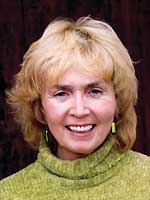
Although award-winning author Lee Smith doesn’t write specifically for audio productions, listeners probably don’t believe that. It’s not surprising that her
novels sparkle when recorded because auditory elements are crucial to her process.
Lemony Snicket
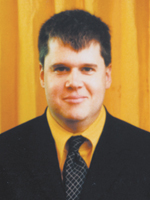
Daniel Handler, a pleasant fellow from San Francisco, bears an uncanny resemblance to Lemony Snicket, mysterious author of bestselling children’s books. Handler even narrated Snicket’s fifth book, THE AUSTERE ACADEMY , an experience that left him reeling.
Nicholas Sparks
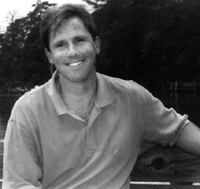
Most writers are driven by the almost compulsive need to communicate what touches them deeply in their own lives. Nicholas Sparks’s novels seem to express the universal desire for love. One of the best ways for Sparks to quite literally communicate his theme was to narrate the audio publication of his most recent novel, A WALK TO REMEMBER. It was an opportunity he almost didn’t get. Originally slated to record the nostalgic musings of the novel’s hero, Landon Carter, was “Ally McBeal” star Gil Bellows. When that fell through at the last minute, Time Warner called on Sparks to fill in. “It was amazing,” says Sparks. For him the thrill of performing A WALK TO REMEMBER was twofold.
Jerry Spinelli
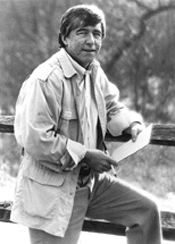
“Maybe I’m not your ideal AudioFile subject,’’ says Newbery-winning children’s author Jerry Spinelli. “I don’t listen to many audiobooks. A little William Faulkner. A little Dylan Thomas. To me, audiobooks seem to be an in-car thing, and the stop-and-go driving I do around Willistown, Pennsylvania, doesn’t lend itself to ready listening.” Spinelli only has to commute as far as the office in his own home. Longer trips are usually devoted to plot discussions with his wife and fellow children’s author, Eileen.
Amy Stewart

Listening to one of her books on audio used to make Amy Stewart cringe. She could only bear to hear a “snippet” before turning them off. The fault wasn’t the audiobooks--“they were great.” Instead, the author of six critically acclaimed nonfiction books, including FLOWER CONFIDENTIAL and THE DRUNKEN BOTANIST, says it was her writing. “I’d want to change every other line.”
And then Christina Moore became the narrator of Stewart’s first novel, GIRL WAITS WITH GUN, which is based on the real life of Constance Kopp, one of America’s first female deputy sheriffs.
Robert Stone
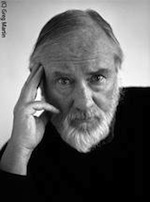
Robert Stone, respected author of seven critically acclaimed novels, sees audiobooks as a great way to start kids reading. “With contemporary readers,” he says, “I sometimes wonder if they have any sense of prose at all. It [audiobooks] might be a tool for teaching people how to read.” Fresh from a stint in the high school trenches, Stone offers, “You listen to a lot of speech of adolescents, and what they’re speaking is like ‘reinventing dialect.’ Standard speech collapses into shorthand of various kinds.” Stone believes “kids don’t know how to speak or express themselves.” He adds, “I really see it in the same way that a parent reading to you gets you reading. You could launch kids with the audio.”
Deborah Tannen
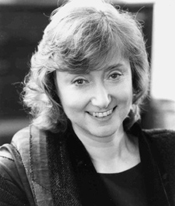
Deborah Tannen is probably the most famous linguist of our time; her reputation is on par with Margaret Mead’s stature in the field of anthropology, according to one publication. Though she’s a highly respected professor at Georgetown University and has written many scholarly books, her bestsellers, THAT’S NOT WHAT I MEANT and YOU JUST DON’T UNDERSTAND, put her on the map as someone with keen insights about language and relationships. She followed with Talking from 9 to 5, about conversational styles in the workplace; THE ARGUMENT CULTURE, about combativeness in public discourse; and her most recent book, I ONLY SAY THIS BECAUSE I LOVE YOU.
Charles Todd
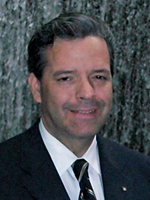
Sixteen years ago, not long after returning from a trip to England, Charles Todd, a native of Virginia, and his North Carolina-born mother, Caroline, set out together to write a book. They didn’t follow any rule book for collaboration. They aren’t the typical writing team. Rugged and wry-mouthed Charles is no momma’s boy by anyone’s definition. Neither is Caroline an overbearing mother. When they finished writing A TEST OF WILLS (1996), they had no idea whether anyone would read their book. Eighteen novels later, writing under the name “Charles Todd,” the pair has garnered multiple awards, several New York Times Notable Books inclusions, and other accolades.
Susan Vreeland
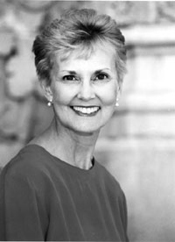
Susan’s Vreeland’s love for the world of art began early. “It started when I was about 8 years old when my step-grandfather came to live with us. We had an art studio for him in the backyard, where I would watch him paint. I remember one day he took my hand in his gnarled, spidery one, and together we painted a watercolor of a calla lily.” That moment, she says, created a passion for painting and sculpture that she nurtured during 30 years as a high school English teacher. The idea for Vreeland’s first novel about art, Girl in Hyacinth Blue, came as she was developing a collection of short stories, each written from the point of view of a character peripheral to an artist: Monet’s gardener at Giverney, for example, and a girl whose back is turned toward the viewer in a Vermeer painting. Imagining the girl to be Vermeer’s daughter, Vreeland wrote a short story that became a critically acclaimed novel.
Minette Walters
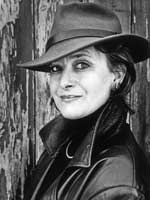
A few years ago, British suspense novelist Minette Walters packed up the audio versions of all her books and sent them to the woman who had been headmistress of her childhood boarding school. “I got this sweet letter in reply.” Transforming her naturally exuberant tone into the precise diction of a 99-year-old retired schoolteacher, Walters recites the words from memory: “Dear Minette, I have listened with great interest to your books on audio. I couldn’t believe it; they are very imaginative. But I was a little concerned about the language. You used to be such a nice girl.”
Garry Wills
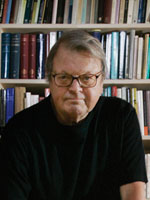
Garry Wills may be the only man ever to choose THE HISTORY OF THE DECLINE AND FALL OF THE ROMAN EMPIRE as a workout tape. But he did and has fond memories of running to the prose of Edward Gibbon while on vacation in Mexico.
Simon Winchester
![Simon Winchester [photo by Setsuko Winchester]](/content/uploaded/images/authors/simon-winchester-by-setsuko winchester-150x150.jpg)
Winchester’s book, THE PROFESSOR AND THE MADMAN, concerns one of the great intellectual milestones of recent times, the creation of the Oxford English Dictionary. For those of you who have never heard of the OED, it’s a twelve-volume* lexicon composed on historic principles, carefully tracing the origin and evolution of English words and phrases and giving copious examples. It appeared in 1928 after 70 years of work, almost instantly becoming the ultimate reference on the English language. It still enjoys that status today.
Stuart Woods
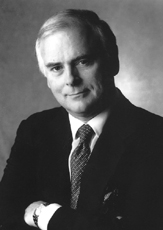
With twenty published novels, and more than thirty audiobooks, few writers are as well rep-resented in the audiobook world as Stuart Woods. Half-a-dozen Woods audio-books are slated for pub-lication in 2000, including his latest novel, THE RUN (in abridged and unabridged formats from Harper Audio), and an unabridged reading of his 1981 novel Chiefs (Recorded Books).
Jacqueline Woodson
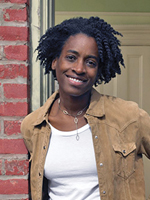
Jacqueline Woodson was a storyteller even as a child--although when she was younger, she says, these stories weren’t the “once-upon-a-time kind,” but more outright lies, tall tales she told to see just how much she could get away with. “It wasn’t malicious,” she laughs. “I just loved to engage people with stories from a young age, and I didn’t know how else to do it.”
The latest audiobook reviews, right in your inbox.
Get our FREE Newsletter and discover a world of audiobooks.



